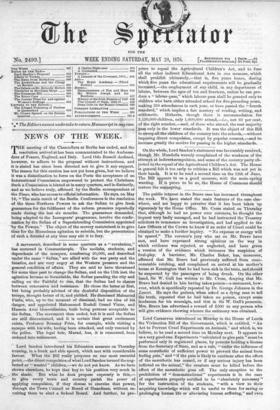The public interest in the Bravo case has increased throughout
the week. We have stated the main features of the case else- where, and are happy to perceive that it has been taken up vigorously by the Home Office. Mr. Cross stated on Thursday that, although he had no power over coroners, he thought the inquest very badly managed, and he had instructed the Treasury solicitors to commence an investigation, and had applied to the Law Officers of the Crown to know if an order of Court could be obtained to make a further inquiry. "No expense or energy will be spared." The coroner's jury who sat on Mr. Bravo have met, and have expressed strong opinions on the way in which evidence was rejected, or neglected, and have given a version of the evidence which increases the suspicion of foul-play. A barrister, Mr. Charles Baker, has, moreover, affirmed that Mr. Bravo had previously suffered from unac- countable retching, and complained on arrival at his mother's house at Kensington that he had been sick in the train, and should be suspected by the passengers of being drunk. On the other hand, Sir W. Gull has written to Mr. Cross, denying that Mr. Bravo had denied to him having taken poison—a statement, how- ever, which is specifically repeated by Dr. George Johnson in the Lancet. He says the patient, when asked as a dying man to tell the truth, repeated that he had taken no poison, except some laudanum for his neuralgia, and this in Sir W. Gull's presence. Mrs. Bravo has advertised a reward of 1500 to any person who will give evidence showing whence the antimony was obtained.






























